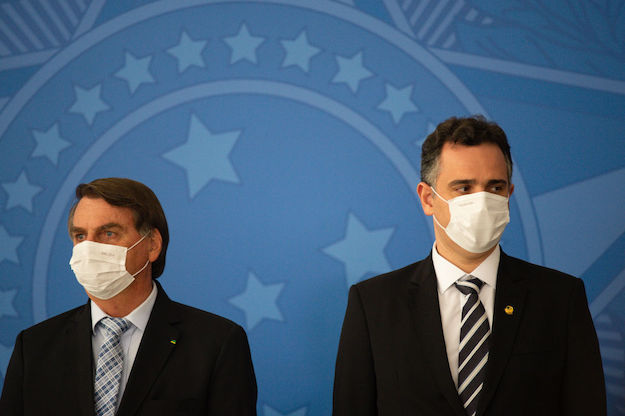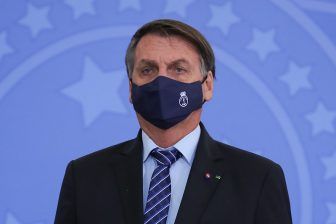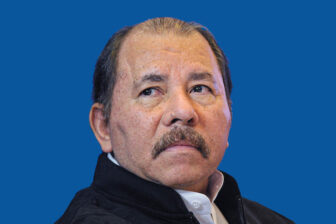SÃO PAULO – Throughout the past year, Brazil’s President Jair Bolsonaro surprised critics by showing remarkable political resilience, shrugging off the resignation of two popular ministers, Brazil’s economic collapse and an out-of-control pandemic through a mix of diversionary tactics, authoritarian threats and increased public spending for the poorest. In February, two candidates backed by Bolsonaro won the top positions in the Senate and the Chamber of Deputies, and the president’s embrace of the powerful centrão parties’ coalition limited the risk of impeachment. The opposition was struggling and Bolsonaro seemed to be on track for reelection in 2022.
Since then, however, the mood has darkened in the presidential palace in Brasília. Not only has the Supreme Court annulled the convictions of ex-President Luiz Inácio Lula da Silva, but he now leads in the polls for next year’s presidential election. To complicate matters further, in early April a Supreme Court justice ordered the Senate to initiate the congressional inquiry — requested by opposition parties — into the federal government’s response to the pandemic. That committee is set to meet for the first time this week.
The outcome of such inquiries — known in Brazil by the Portuguese acronym CPI — is uncertain, and those who see it as a mortal threat to Bolsonaro’s presidency are likely to be disappointed. There are four reasons why the impact of the investigation may be limited.
First, while CPIs can endanger presidents — as was the case in 1992, when a committee hearing of then-President Fernando Collor’s right-hand man Paulo Cesar Farias effectively ended Collor’s presidency — they cannot initiate impeachment proceedings by themselves. Rather, if a commission’s final report points to a crime, the Prosecutor General Augusto Aras, a Bolsonaro stalwart, would have to take action. Alternatively, the Congress’s president could initiate an impeachment proceeding, an equally unlikely scenario at this stage. Since 1992, several presidents, including Fernando Henrique Cardoso and Lula, successfully maneuvered behind the scenes to blunt the impact of CPIs that could have threatened them. In the same way, Bolsonaro will try to co-opt members of the commission — by offering cabinet jobs, promoting infighting between members of the CPI (some of whom are allies of the president), and diluting the inquiry’s focus. He may also throw his former Minister of Health Eduardo Pazuello under the bus, arguing that the presidency was unaware of the pandemic’s mishandling. Bolsonaro’s former communications secretary said as much in a recent interview, accusing Pazuello of incompetence, but saying the president was not to blame.
Second, given how openly and unabashedly Bolsonaro embraced his denialist strategy vis-à-vis the pandemic over the past year, the inquiry may fail to reveal any new data capable of shocking people. Many have long since grown accustomed to the president’s controversial — and many say criminal — decision to minimize the threat COVID-19 poses to public health, to mock mask-wearing, to promote unproven medicines such as chloroquine, and to actively campaign against social distancing measures. Public opinion has also largely priced in statements anticipated from vaccine producers during the hearings confirming that Bolsonaro was unwilling to purchase vaccines last year.
Third, Bolsonaro, a skilled communicator, can be expected to successfully divert public attention on days when hearings may be particularly damning for the government — largely through purposefully outrageous comments, like in March when he told Brazilians to “stop whining” after the most lethal day of the pandemic until then, by insinuating that he may stage a military coup, or by trying to dominate the news cycle by making homophobic, misogynistic or other inflammatory statements.
Finally, the Workers’ Party, today the largest opposition party in Congress, has shown no interest in taking a leading role in the inquiry or in mobilizing its followers to call for impeachment proceedings against the president. The primary reason for this apathy being that Lula is thought to have the best chances if he faces Bolsonaro in a run-off.
And yet, while the congressional investigation is unlikely to single-handedly bring down the president, it has the potential to significantly hurt Bolsonaro’s strategy to reclaim control of the public debate and prepare for reelection in 2022. There are two ways the CPI may fulfill that role.
First, the investigation’s hearings will be covered in detail by the mainstream media and appear on prime time television. This could consolidate the growing perception among moderates that the Bolsonaro government lacks the competence to address the country’s numerous challenges and to initiate an economic recovery. While it is unlikely to sway hardline supporters of the president (about one third of the population) who would never consider voting for the Workers’ Party, it could, if the hearing’s mise-en-scène is done right, convince more centrist voters mostly concerned with the economy that Bolsonaro’s radicalism is an obstacle to overcoming the crisis. Since Brazil’s constitution allows CPIs to bring in witnesses against their will, there are chances of memorable exchanges, for example involving former Health Minister Pazuello. The administration’s frantic and somewhat chaotic response to the inquiry so far — involving a leaked document that lists the potential mistakes the government made in the fight against the pandemic — suggests further missteps may play into the hand of Bolsonaro’s critics.
Most importantly, the investigation may undermine the strategy that has guided Bolsonaro’s response to the pandemic from the very beginning: deny responsibility and shift the blame to others, be they governors, mayors or health experts. Indeed, by insisting on a long disproven dichotomy of “economy vs. lockdown,” Bolsonaro succeeded in positioning himself as a champion of the common man for whom staying at home was not an option. The loss of jobs could thus be conveniently blamed on those defending social distancing measures. Indeed, former Minister Osmar Terra, one of Bolsonaro’s fiercest supporters, still maintains that lockdown measures actually increase deaths since people supposedly infected themselves at home. As long as Bolsonaro ensures that a significant part of the population believes in this narrative, he remains highly competitive in next year’s presidential election.
Yet as details emerge about the Bolsonaro government’s slow vaccine procurement, as more people realize that there will be no economic recovery without a successful vaccination campaign, and as images circulate of returning normality in the United States, the president’s line of reasoning may become less convincing. After all, the coronavirus continues to spread mercilessly, killing more Brazilians than during any other stage of the pandemic. The total number of COVID victims in the country is set to surpass 400,000 in the coming days and may reach half a million in July, experts predict.
The economy is in shambles, inflation is at its highest in over four years and the poverty rate is skyrocketing, with tens of millions grappling with hunger and food insecurity. Bolsonaro’s buffoonish style and bullying tactics often make observers forget that he is an unusually perspicacious strategist with an acute sense of public opinion, and it would be far too early to count him out. But as the congressional inquiry is set to produce damaging news for at least three months (it may be prolonged for another three), Bolsonaro faces yet another obstacle on his path towards reelection.








